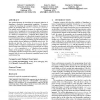Free Online Productivity Tools
i2Speak
i2Symbol
i2OCR
iTex2Img
iWeb2Print
iWeb2Shot
i2Type
iPdf2Split
iPdf2Merge
i2Bopomofo
i2Arabic
i2Style
i2Image
i2PDF
iLatex2Rtf
Sci2ools
124
Voted
SIGSOFT
2007
ACM
2007
ACM
Measuring empirical computational complexity
The standard language for describing the asymptotic behavior of algorithms is theoretical computational complexity. We propose a method for describing the asymptotic behavior of programs in practice by measuring their empirical computational complexity. Our method involves running a program on workloads spanning several orders of magnitude in size, measuring their performance, and fitting these observations to a model that predicts performance as a function of workload size. Comparing these models to the programmer's expectations or to theoretical asymptotic bounds can reveal performance bugs or confirm that a program's performance scales as expected. Grouping and ranking program locations based on these models focuses attention on scalability-critical code. We describe our tool, the Trend Profiler (trend-prof), for constructing models of empirical computational complexity that predict how many times each basic block in a program runs as a linear (y = a + bx) or a powerlaw (...
Empirical Computational Complexity | SIGSOFT 2007 | Software Engineering | Theoretical Computational Complexity | Worst-case Theoretical Complexity |
Related Content
| Added | 20 Nov 2009 |
| Updated | 20 Nov 2009 |
| Type | Conference |
| Year | 2007 |
| Where | SIGSOFT |
| Authors | Simon Goldsmith, Alex Aiken, Daniel Shawcross Wilkerson |
Comments (0)

